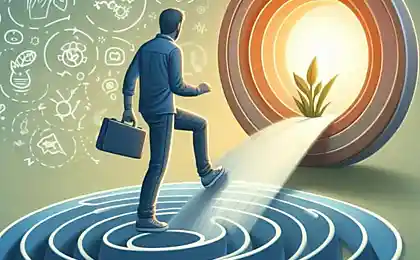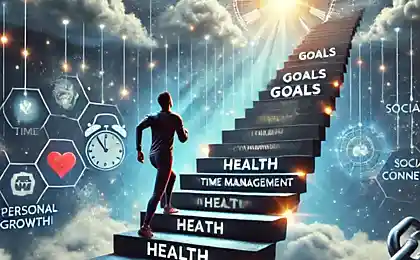147
8 ways to develop your talents and abilities

8 ways to develop your talents and abilities
Talent development is a process that requires effort, time and, most importantly, a sincere desire to become better. Each person has a unique set of abilities that, with the right approach, can be fully revealed. Modern science shows that talent is not only an innate predisposition, but also the result of purposeful work on oneself.
In an era of information technology and constant change, self-development is becoming a key success factor. The neuroplasticity of the brain allows us to form new neural connections at any age, which means limitless opportunities for personal growth.
1st
Identify your natural inclinations
The first step to developing talent is understanding your natural abilities. Psychologists distinguish eight types of intelligence according to the theory of Howard Gardner: linguistic, logical-mathematical, spatial, musical, bodily-kinesthetic, interpersonal, intrapersonal and naturalistic.
Albert Einstein was considered an incompetent student as a child, but his spatial intelligence allowed him to revolutionize physics. He often said that he did not think in words, but in images and pictures.
Practical advice:
Keep a journal of observations for a month. Write down what tasks are easy for you, what is interesting and what is difficult. This will help you identify your natural talents.

2.
Apply the principle of intentional practice
The concept of intentional practice, developed by psychologist Anders Erickson, shows that the quality of training is more important than quantity. This means focusing on your weaknesses, constantly working outside your comfort zone, and getting immediate feedback.
Research shows that experts in any field devote about 10,000 hours to deliberate practice. However, it is important to understand that this is not just a repetition of the same action, but a constant improvement of technology.
Practical advice:
Break down your skills into micro-elements. For example, if you are learning to play the piano, practice your finger technique, rhythm and musicality separately. Each element requires a specific approach to training.
3
Develop a growth mindset
Psychologist Carol Dweck identifies two types of thinking: fixed and growth-oriented. People with a growth mindset believe that abilities can be developed through effort and learning. This thinking is critical to unlocking potential.
Michael Jordan, a basketball legend, didn't make the high school team in high school. Instead of giving up, he used it as motivation for even more intense training. His commitment to growth has helped him become one of the greatest athletes of all time.

4.
Look for mentors and build a growth ecosystem
Mental models of experts in your field can greatly speed up the learning process. Mentors not only convey knowledge, but also help to avoid typical mistakes, provide a network of professional contacts and motivate in difficult moments.
Creating a growth ecosystem includes not only formal mentors, but also like-minded communities, online courses, books, podcasts, and other sources of knowledge. The variety of sources enriches understanding and prevents tunnel vision.
5
Practice an interdisciplinary approach
Many breakthroughs occur at the intersection of different disciplines. Developing talent in related fields creates unique combinations of knowledge that can lead to innovative solutions. This approach is called polymatism, the study of multiple disciplines.
Steve Jobs combined technology, design and the humanities to create revolutionary Apple products. His college calligraphy class subsequently influenced typography in Mac computers.
Practical advice:
Each month, learn something new from a field far from your primary specialization. Look for connections between different disciplines and apply principles from one area to another.
6
Use the power of reflection and metacognition
Metacognition is thinking about thinking, the ability to analyze your own thought processes. Regular reflection helps identify learning patterns, understand which techniques work best, and adjust development strategies.
Studies show that students who regularly reflect on their learning perform better. Reflection activates the prefrontal cortex, which is responsible for planning and self-control.
7
Develop Emotional Intelligence
Emotional intelligence – the ability to understand and manage one’s own emotions as well as those of others – is critical to developing talent. It includes self-awareness, self-regulation, motivation, empathy, and social skills.
Oprah Winfrey has turned her capacity for empathy into a media empire. Her emotional intelligence allowed her to build deep connections with her audience and become a more influential person.
Practical advice:
Practice mindfulness meditation for 10-15 minutes daily. This will help develop self-awareness and emotional regulation. Also keep an emotional diary, writing down your feelings and their impact on productivity.
8.
Create the conditions for creativity
Creativity requires specific conditions: time for reflection, diverse experiences, willingness to experiment, and acceptance of failure as part of the process. Creating a physical and mental environment conducive to creativity is critical to developing talent.
Neuroscience shows that creative insights often occur in the default mode of the brain network — when we are not focused on a particular task. Therefore, it is important to give the brain time to wander freely.
Talent development is a marathon, not a sprint. Take a small step forward every day, be patient with yourself and celebrate small victories. Your unique talent is waiting to be revealed, and with the right approach, you will be able to reach the heights you once dreamed of.
Glossary
Neuroplasticity is the ability of the brain to change its structure and function in response to experience, learning, or damage throughout life.
Intentional practice is a specially designed activity aimed at improving performance that requires effort and is not always pleasant.
The growth mindset is the belief that abilities and intelligence can be developed through effort, learning, and perseverance.
Metacognition is the awareness and understanding of one’s own thought processes, “thinking about thinking.”
Emotional intelligence is the ability to recognize, understand and manage one’s own emotions as well as those of others.
Polymatics is the study of multiple disciplines to gain a comprehensive understanding of the world and create innovative solutions.
The default network of the brain is a neural network active during rest and free thinking, which plays an important role in creative processes.
6 types of behavior of the interlocutor that can not be tolerated
16 Reminders to Make Goals Realistic























